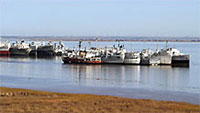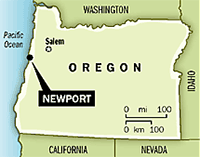Plan to scrap old ships stirs pollution worries
Newport, Ore., weighs job benefits against environmental risks in national salvage effort.
by Brad Knickerbocker, Staff writer of The Christian Science Monitor
 |
 |
 |
 |
| |
 |
|
| |
'GHOST FLEET': Many of the nation's 100-plus ships waiting for salvage are warships anchored here in Suisun Bay, northeast of Oakland, Calif. |
|
 |
 |
 |
 |
 |
 |
| |
 |
|
 |
 |
 |
|
| |
18 January 2006 (Ashland, ORE.) – Oregon prides itself on its coast. Wild and pristine. Open to the public and not fenced off by wealthy landowners. But in recent years, the area also has seen steep declines in traditional industries, timber and fishing.
So a proposal to haul old ships here for salvage and recycling presents a classic case of economic development versus environmental protection. The new business would mean well-paying jobs turning ship hulls into valuable scrap metals. But it also brings with it concerns about toxic materials - asbestos, waste oil, lead paint, mercury, PCBs, and radioactive substances - seen as threats to marine life.
Locally, the issue comes to a head this week as the Port Commission in Newport, Ore., decides whether to let the proposal proceed. Nationally, it raises questions about the nation's "ghost fleet" - more than 100 obsolete ships lined up in rusty rows in the waters of Virginia, Texas, and California. Congress had ordered the US Transportation Department's Maritime Administration (MARAD) to dispose of them before October 2006. But the slow pace of disposal (just a handful a year) makes meeting that deadline impossible. The US Government Accountability Office charges that MARAD has mismanaged the effort.
Noting that there have been spills of hazardous materials, the watchdog agency also warns that "the ships could cause a costly environmental disaster in some of the nation's sensitive waterways."
At present, there are only a handful of "shipbreaking" facilities in the US, mainly in Virginia and Texas. There, the toxic materials are removed and the ships cut up for scrap metals.
Though many ships are on the West Coast (parked there after World War II and the Vietnam War), there is no ship-salvage facility here. Such ships have to be towed from Suisun Bay near San Francisco through the Panama Canal to the Gulf Coast port of Brownsville, Texas.
Now, a Virginia company wants to do the shipbreaking in Oregon by leasing land on Yaquina Bay in Newport. This would provide 125 full-time well-paying jobs in an area where many timber and commercial fishing jobs have disappeared. Local officials also talk up the proposal as providing "a visual curiosity and attraction to the general public - additional waterfront 'flavor' for visitors and residents alike."
After a visit to the company's shipbreaking site in Virginia, port commissioners reported, "It is clean, tidy, safe, and welcome in the community."
But marine biologists, commercial fishermen, conservationists, and many local residents are concerned about the threat of contamination.
Bay Bridge Enterprises, the Virginia company recently acquired by the multinational corporation Adani Group, headquartered in India, has a good safety and environmental record, according to federal and state data. But in a letter to port commissioners last week, officials of a marine science center at Oregon State University raised questions about the proposal to break up 12 to 15 ships a year. Among them: a greater need to monitor pollutants in the bay; inadequate containment of paint chips and other toxics exposed as ships are cut up; insufficient protections against nonindigenous species carried on ship hulls; and the need for an independent and rigorous risk assessment of the operation.
"The stakes are very high, and this means that a detailed study of all the risks and benefits of this proposed operation is necessary before it can be considered acceptable," wrote George Boehlert, director of the marine science center.
At packed community meetings, others expressed concern about noise pollution, land values, and the impact on recreation and tourism. Newport also is home to a major aquarium.
The debate over US ships headed for the scrap heap has a global context. The environmental group Greenpeace is protesting the towing of the old French aircraft carrier Clemenceau from Toulon to the world's largest shipbreaking yard on the Indian coast, which has corporate connections to the company that wants to start shipbreaking in Oregon.
Most of the 600 to 700 such ships a year worldwide are run aground in India, Pakistan, and Bangladesh, then torn apart by hand. Critics say this may be in violation of the 1989 Basel Convention, which controls the international movement of hazardous wastes and their disposal - particularly from industrial nations to developing countries. The US is not a party to the convention, and the Bush administration has been exploring ways to send retired US ships to China and other countries for disposal.
"We're adamantly fighting any attempt to transfer pollution from North to South, from rich to poor," says Jim Puckett of Basel Action Network in Seattle. "These ships are moving precisely because the environmental and labor costs in developing countries are much less than they are in the developed countries."
The controversy is likely to heat up as hundreds of single-hulled oil tankers are phased out in favor of double-hulled tankers (as required by the US and United Nations regulations).
FAIR USE NOTICE. This document contains copyrighted material whose use has not been specifically authorized by the copyright owner. The Basel Action Network is making this article available in our efforts to advance understanding of ecological sustainability and environmental justice issues. We believe that this constitutes a 'fair use' of the copyrighted material as provided for in section 107 of the US Copyright Law. If you wish to use this copyrighted material for purposes of your own that go beyond 'fair use', you must obtain permission from the copyright owner.
More News
|